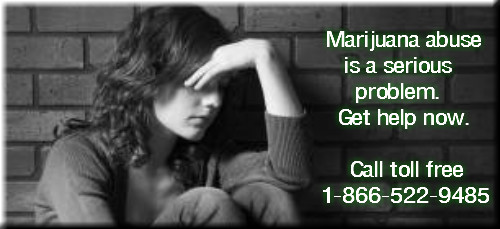Marijuana Abuse
- Dangers of Marijuana Abuse
- How Many People Abuse Marijuana
- Marijuana Abuse Effects
- Marijuana Abuse In America
- Marijuana Abuse Signs
- Marijuana Abuse Statistics
- Who Abuses Marijuana
- Causes of Marijuana Abuse
- Long Term Marijuana Abuse
- Marijuana Abuse Facts
- Marijuana Abuse Teens
- Treatment for Marijuana Abuse
- Teen Marijuana Abuse
- Chronic Marijuana Abuse
- How Much Does Marijuana Cost
- Marijuana Abuse Dependance
- Marijuana Plant Pictures
- Marijuana Strains

 Marijuana Abuse Signs
Marijuana Abuse Signs
There are no hard and fast rules when it comes to spotting marijuana abuse signs. The main thing to look out for is changes in behavior, attitude, appearance, friends, or activities. Bear in mind that many of the signs listed below may also be caused by stress, depression, or other problems. Whatever the cause, they may warrant attention, especially if they persist or if they occur in a cluster. Consult a professional in the field of drug addiction and recovery if you suspect drug use. Getting help early on can facilitate your loved one to get back on track and develop more effective coping skills, often preventing further problems.
The National Library of Medicine documents these telltale signs of drug abuse in drug-taking individuals:
- Change in friends. Hanging out with a new group.
- Changes in behavior and attitude.
- Deteriorating family relationships.
- Involvement on the wrong side of the law.
- Long, unexplained absences.
- Lying and stealing.
- Obvious intoxication, delirious, incoherent or unconscious.
- Seclusive behavior - long periods spent in self imposed isolation.
- Decrease in school or work performance.
There are many common marijuana abuse signs. If your loved one is high on marijuana, they might:
- Have a hard time remembering things that just happened.
- Have very red, bloodshot eyes.
- Seem dizzy and have trouble walking.
- Seem silly and giggly for no reason.
Another one of the common marijuana abuse signs is tiredness and lethargy. This happens when the early effects fade after a few hours. Additionally, some marijuana users show signs of withdrawal when they do not use the drug. They develop symptoms such as restlessness, loss of appetite, trouble sleeping, weight loss, and shaky hands. Loved ones should be aware of changes in the users behavior, although this may be difficult with teenagers. It is important to look for depression, fatigue, carelessness with grooming, hostility, and deteriorating relationships with family members and friends. In addition, changes in academic performance, increased absenteeism or truancy, lost interest in sports or other favorite activities, and changes in eating or sleeping habits could be marijuana abuse signs in teens and young adults. However, these signs may also indicate problems other than use of drugs.
In addition, loved ones should be aware of these marijuana abuse signs:
- Anxiety
- Bloodshot eyes
- Cigarette rolling papers
- Clothing, posters, jewelry, etc., promoting drug use
- Difficulty thinking
- Dilated (large) pupils
- Discolored fingers
- Distorted sensory perceptions
- Dry mouth
- Euphoria (temporary feelings of elation, energy and limitless power)
- Feeling sluggish
- Grandiosity (acting in a pompous or boastful manner)
- Impaired judgment
- Impaired short-term memory
- Inappropriate laughter
- Increased appetite, craving sweets
- Increased heart rate
- Odor on clothes and in the bedroom
- Pipes, bongs, homemade smoking devices (you may see sticky residue from burned marijuana)
- Reduced coordination
- Reduced motivation
- Sadness/depressed mood
- Seeds that have been cleaned from marijuana
- Sensation that time is passing slowly
- Sleepiness and/or Sleepy appearance
- Social withdrawal and isolation
- Temporary feelings of reduced anxiety or stress
- Use of eye drops
- Use of incense and other deodorizers
People who have a problem with marijuana abuse are often trying to self-medicate or find escape from the issues that are really bothering them. Getting help for these people early on can possibly help avoid a dark future. Remember that if you love them, you will help them. When family, friends, and associates of a chemically dependent individual allow that individual to continue their marijuana abuse, their behavior is called enabling.
